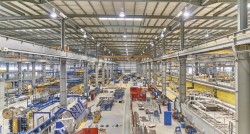A new type of compact nuclear power station is to be researched by a consortium including Laing O'Rourke, Bam Nuttall and Atkins.
Nine companies are providing an initial investment of £18m to the project, which matches £18m of funding provided by government body UK Research and Innovation (UKRI).
The power stations could be built from components manufactured offsite in factories around the UK, before being transported to nuclear sites for rapid assembly.
He added that "there could be a new arm to the existing Laing O'Rourke facility" to deliver the power-station components, but that the first station would not be delivered until the late 2020s at the earliest, and the first 16-month phase would examine the feasibility of the project.
The stations, each of which could power a city the size of Leeds, which has a population approaching 500,000 people, have a target cost of £1.8bn each by the time five stations have been constructed.
That figure compares with about £23bn for Hinkley Point C, though the Somerset facility will be able to power 6 million homes, when it is operational.
The full list of companies in the consortium is Bam Nuttall, Laing O'Rourke, Atkins, National Nuclear Laboratory, Assystem, Rolls-Royce, Wood, The Welding Institute and the Nuclear Advanced Manufacturing Research Centre.
Rolls-Royce is leading the project. Its chief technology officer, Paul Stein, said: "Tackling climate change requires collaboration across industries and governments to find effective, affordable and sustainable ways of achieving net-zero [carbon emissions] by 2050.









